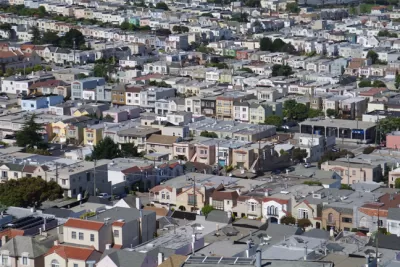"Jobs-rich area," a new term that targets some suburban regions, is among amendments added March 11 to Senate Bill 50, the reincarnation of Wiener's controversial SB 827 housing bill that died last year.

Senate Bill 50, dubbed the More HOMES Act by the author and new chair of the Senate Housing Committee, Sen. Scott Wiener (D-San Francisco), "earned criticism for targeting urban areas like San Francisco and mostly letting cities that chose not to offer robust transit — including those on the Peninsula — off the hook by not requiring them to raise zoning height requirements," reports Joe Fitzgerald Rodriguez for the San Francisco Examiner.
Amendments were added on March 11, which were reviewed by the San Francisco Planning Department.
Now, however, the Planning Department’s analysis notes that SB 50 has taken care of that concern by also targeting “job-rich” [sic] areas — namely, suburbs that say “yes” to mega-offices for Google and Facebook, but “no” to more housing for workers.
According to the new text, “jobs-rich areas” would be identified by the Department of Housing and Community Development in consultation with the Office of Planning and Research. These areas are "both high opportunity and jobs rich," and would meet either of the following criteria:
- "New housing sited in the tract would enable residents to live in or near a jobs-rich area, as measured by employment density and job totals.
- "New housing sited in the tract would enable shorter commute distances for residents, compared to existing commute levels."
Adam Brinklow, associate editor of Curbed SF, writes on March 12 that according to Wiener’s office, these are areas that "would allow people to live close to where they work, or new housing developed in this area would help to reduce vehicle miles traveled."
Brinklow notes additional amendments, including:
-
New minimum inclusionary zoning requirements of 15 to 25 percent for low-income homes depending on the size of the project.
-
"Protection for mobile homes. The bill now extends its displacement protections to mobile home residents."
Any transit-rich or jobs-rich housing project that meets the criteria are eligible to receive waivers, called "equitable communities incentives," from "maximum controls on density" and "minimum automobile parking requirements greater than 0.5 automobile parking spots per unit."
Endorsements
The legislation has been receiving endorsements from many organizations and elected officials. On Thursday, the Bay Area Rapid Transit District (BART) Board voted 5-3 to endorse SB 50, reports Brinklow on March 14.
“SB 50 will help ensure the production of more housing around BART stations,” VP Rebecca Saltzman said Thursday, noting that BART plans to build 20,000 housing units on land it owns around stations by 2040.
An impressive number of press releases on the Wiener's website show endorsements from:
-
February 27, 2019: Environmental organizations: Natural Resources Defense Council (NRDC), CALPIRG, and Environment California. They join the California League of Conservation Voters.
-
February 20, 2019: AARP California, the voice of over 3 million Californians over age 50
-
January 31, 2019: Housing: Non-Profit Housing Association of Northern California (NPH), and Habitat for Humanity. SB 50 is also supported by the State Building and Construction Trades Council, the California Apartment Association, the San Francisco Housing Action Coalition, the California Renters Legal Advocacy and Education Fund (CaRLA).
"In less savory news, Devin Osiri, executive director of the LA County Democratic Party, tells Curbed SF that the party voted against endorsing the More Homes Act Tuesday," adds Brinklow. "SB 50 faces its first legislative committee hearing later this month."
Hopefully, it will fare better than its predecessor, SB 827, which died at its first hearing.
Related in Planetizen:
-
Warming to Transit Oriented Development in San Francisco [Poll shows support for SB 50], February 12, 2019
-
SB 827: Part 2, December 4, 2018
Hat tip to Gladwyn d'Souza.
FULL STORY: New version of housing density bill calls for suburbs to ‘do their share

Maui's Vacation Rental Debate Turns Ugly
Verbal attacks, misinformation campaigns and fistfights plague a high-stakes debate to convert thousands of vacation rentals into long-term housing.

Planetizen Federal Action Tracker
A weekly monitor of how Trump’s orders and actions are impacting planners and planning in America.

Chicago’s Ghost Rails
Just beneath the surface of the modern city lie the remnants of its expansive early 20th-century streetcar system.

Bend, Oregon Zoning Reforms Prioritize Small-Scale Housing
The city altered its zoning code to allow multi-family housing and eliminated parking mandates citywide.

Amtrak Cutting Jobs, Funding to High-Speed Rail
The agency plans to cut 10 percent of its workforce and has confirmed it will not fund new high-speed rail projects.

LA Denies Basic Services to Unhoused Residents
The city has repeatedly failed to respond to requests for trash pickup at encampment sites, and eliminated a program that provided mobile showers and toilets.
Urban Design for Planners 1: Software Tools
This six-course series explores essential urban design concepts using open source software and equips planners with the tools they need to participate fully in the urban design process.
Planning for Universal Design
Learn the tools for implementing Universal Design in planning regulations.
planning NEXT
Appalachian Highlands Housing Partners
Mpact (founded as Rail~Volution)
City of Camden Redevelopment Agency
City of Astoria
City of Portland
City of Laramie





























